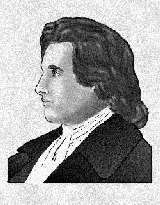
Born: August 28, 1749, in Frankfort-am-Main, Germany
Died: March 22, 1832, in Weimar, Germany
Johann Wolfgang von Goethe was a poet, dramatist, philosopher, scientist and a leader of the German intellectual renaissance of the late eighteenth century. He is noted for his ability to understand human individuality and expresses a modern view of humanity's relationships.
His father was an autocratic wealthy Frankfort lawyer and Imperial Councilor while his mother was a younger, optimistic woman. It was thought that Goethe had died at birth, but he was revived. The experience caused his grandfather to reform the training practices of midwives.
Goethe was educated at home and showed an aptitude for languages. He was forced into a study of law by his father at the University of Leipzig at age sixteen. At university, however, he wrote verse and plays that show his style of subjective writing. Between 1768 and 1769 he returned home to recuperate from an illness. During this time he was influenced by a priest and developed a mystical, spiritual feeling that is best exemplified in Faust.
While studying medicine at Strasbourg, he met Johann Gottfried von Herder who introduced him to the works of Homer and Shakespeare. Herder has also been credited for instilling a sense of national pride in Goethe. About this time, Goethe was also developing a sense of romantic expression, a style that is seen in The Sorrows of Young Werther, published in 1774.
In 1775, he was invited by Karl August, duke of Weimar, to help guide the court. Goethe remained there for the rest of his life, but moved up the court in stature and position. He was very popular in the court. He developed an interest in sciences and mathematics and became published in these disciplines. Later in his life, his style of writing moved back to the classical forms of his youth. He married Christiane Vulpius in 1806.
Goethe's most noted work is Faust, which he published only a year before his death. Based on the legends of a wandering magician, Faust is an enduring work that attempts to understand the existence of man. The work has been translated numerous times, but the most influential were the translations completed by the English poet Carlyle. Through Carlyle, Goethe influenced a generation of Victorian writers.